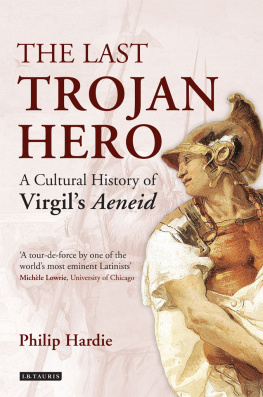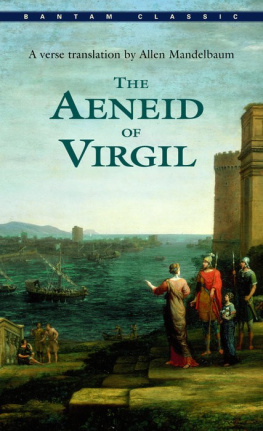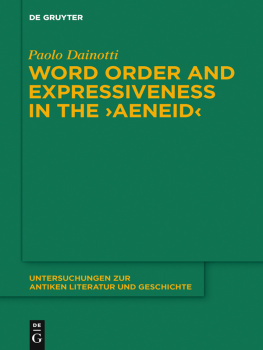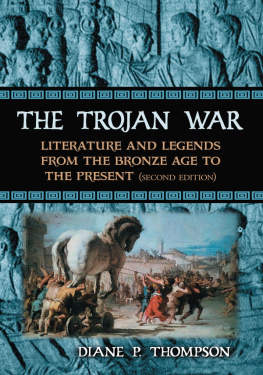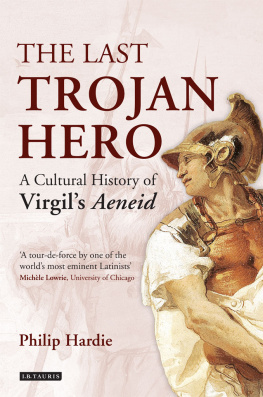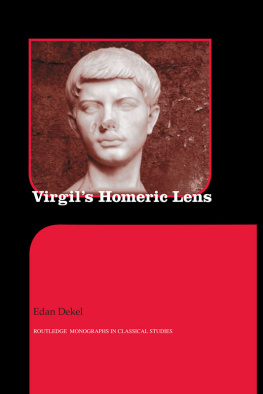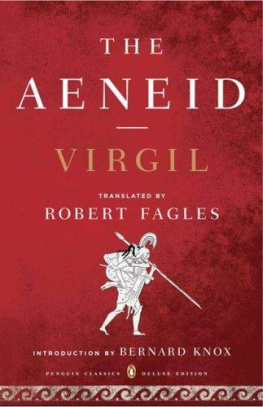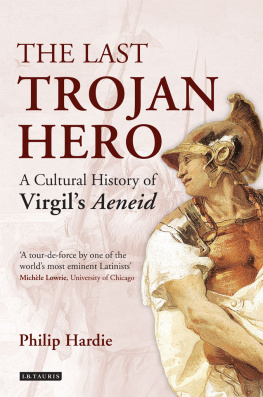Philip Hardie - The Last Trojan Hero: A Cultural History of Virgils Aeneid
Here you can read online Philip Hardie - The Last Trojan Hero: A Cultural History of Virgils Aeneid full text of the book (entire story) in english for free. Download pdf and epub, get meaning, cover and reviews about this ebook. publisher: I.B. Tauris, genre: Religion. Description of the work, (preface) as well as reviews are available. Best literature library LitArk.com created for fans of good reading and offers a wide selection of genres:
Romance novel
Science fiction
Adventure
Detective
Science
History
Home and family
Prose
Art
Politics
Computer
Non-fiction
Religion
Business
Children
Humor
Choose a favorite category and find really read worthwhile books. Enjoy immersion in the world of imagination, feel the emotions of the characters or learn something new for yourself, make an fascinating discovery.
- Book:The Last Trojan Hero: A Cultural History of Virgils Aeneid
- Author:
- Publisher:I.B. Tauris
- Genre:
- Rating:4 / 5
- Favourites:Add to favourites
- Your mark:
- 80
- 1
- 2
- 3
- 4
- 5
The Last Trojan Hero: A Cultural History of Virgils Aeneid: summary, description and annotation
We offer to read an annotation, description, summary or preface (depends on what the author of the book "The Last Trojan Hero: A Cultural History of Virgils Aeneid" wrote himself). If you haven't found the necessary information about the book — write in the comments, we will try to find it.
Philip Hardie: author's other books
Who wrote The Last Trojan Hero: A Cultural History of Virgils Aeneid? Find out the surname, the name of the author of the book and a list of all author's works by series.
The Last Trojan Hero: A Cultural History of Virgils Aeneid — read online for free the complete book (whole text) full work
Below is the text of the book, divided by pages. System saving the place of the last page read, allows you to conveniently read the book "The Last Trojan Hero: A Cultural History of Virgils Aeneid" online for free, without having to search again every time where you left off. Put a bookmark, and you can go to the page where you finished reading at any time.
Font size:
Interval:
Bookmark:
Philip Hardie is a senior research fellow at Trinity College Cambridge and Honorary Professor of Latin at the University of Cambridge. His many books include Virgils Aeneid: Cosmos and Imperium, The Epic Successors of Virgil, Ovids Poetics of Illusion, The Cambridge Companion to Ovid and, edited with S. Gillespie, The Cambridge Companion to Lucretius.
The Last Trojan Hero will become the primary resource for anyone interested in the reception of Virgil and his poetry, and it will serve as an excellent introduction to the topic for under-graduates and the general educated reader. But it is also a book I would recommend to anyone approaching Virgil for the first time. Hardie skilfully combines a sense of Virgils place in ancient literary culture, a masterful overview of debates about the Aeneid in classical scholarship, and a panorama of poetic, artistic and political responses to the epic. Insightful readings are presented throughout, of texts from Ovid Virgils earliest reader to Seamus Heaney. The Aeneids influence is traced through scatological travesty, the work of nation-building, and personal voices of protest or desire. The reader comes away from The Last Trojan Hero with a profound sense of how and why Virgils poem mattered at different times and in different places. Hardie achieves a fine balance of encyclopedic scope and detailed reading, covering with a light touch an extraordinary breadth of material. His learning and interpretative sensibility brilliantly illuminate each text under discussion.
Ellen OGorman, Senior Lecturer in Classics, University of Bristol
I enjoyed Philip Hardies book immensely. It is not only a treasure trove of information about the ways Virgils Aeneid has been read, but also a subtle and complex reading of the text itself, as well as a richly emotional engagement with western culture. Written by one of the most important living scholars of the Aeneid and its reception, this rich and resonant book will endlessly reward its readers, regardless of whether or not they are already familiar with Virgils masterpiece.
Helen Lovatt, Associate Professor in Classics, University of Nottingham
Fast-paced and learned, The Last Trojan Hero is a tour-de-force through the reception of Virgils Aeneid. One of the worlds most eminent Latinists has condensed a lifetime of research into a slim volume whose every page offers a dazzling wealth of ideas clearly expressed a delight for the specialist and the uninitiated alike. Some adaptations are as well known as Dantes underworld and the Christian Virgil, some are surprises, such as Queen Elizabeth I in Didos guise and the American Aeneas. Hardie ranges over German, Spanish, French, Italian, English and Portuguese as he collects nods to Virgil in art and literature from Europe, the Americas, Asia and Africa with a span from Ovid to Ursula Le Guin. More than a collection of references with rich visual documentation, Hardie offers a reading of the Aeneid, its heroes and heroines, its stance on foundation, empire, exile and passion through its variegated reception. His light touch and the simplicity of the presentation belie the depth of thought on display.
Michle Lowrie, Professor of Classics and the College, University of Chicago
In his new book Philip Hardie not only tells the story of Virgils Aeneid, but also of a significant part of western culture. As one would expect from this author, it is a masterful selection and presentation of the rich material at his command. Pursuing the reception of the central text (which is itself already an instance of reception), leads to intriguing insights into the development of literature, art, science and scholarship from antiquity to the present day. Hardies unrivalled knowledge of Virgil and of later periods means that one learns as much about the Aeneid itself as about its later reception. A careful selection of relevant examples opens up a number of different perspectives and creates the framework for a comprehensive history of the legacy of this major epic. At the same time, this is such a well-written book that it will be accessible to all kinds of readers, specialist or not: it can enjoyably and rewardingly be read from cover to cover. Anyone interested in the history of epic will benefit from it and (re)discover new friends and old acquaintances.
Gesine Manuwald, Professor of Latin, University College London

Published in 2014 by I.B.Tauris & Co Ltd
6 Salem Road, London W2 4BU
175 Fifth Avenue, New York NY 10010
www.ibtauris.com
Distributed in the United States and Canada Exclusively by
Palgrave Macmillan
175 Fifth Avenue, New York NY 10010
Copyright 2014 Philip Hardie
The right of Philip Hardie to be identified as the author of this work has been asserted by him in accordance with the Copyright, Designs and Patents Act 1988.
All rights reserved. Except for brief quotations in a review, this book, or any part thereof, may not be reproduced, stored in or introduced into a retrieval system, or transmitted, in any form or by any means, electronic, mechanical, photocopying, recording or otherwise, without the prior written permission of the publisher.
ISBN: 978 1 78076 247 0
eISBN: 978 0 85773 506 5
A full CIP record for this book is available from the British Library
A full CIP record is available from the Library of Congress
Library of Congress Catalog Card Number: available
Typeset in Adobe Caslon Pro by A. & D. Worthington, Newmarket, Suffolk
FIGURES
The Parade of Heroes. Engraving by Franois Chauveau, from Michel de Marolles, Les Oeuvres de Virgile traduites en prose (Paris, 1649). Reproduced by kind permission of the Syndics of Cambridge University Library (X.7.22).
Fama in Aeneid 4, woodcut in Publii Virgilii Maronis Opera, ed. Sebastian Brant (Strassburg, 1502). By permission of the Fitzwilliam Museum, Cambridge.
Meeting of Dante and Virgil. Tapestry after design by Francesco Salviati. Getty Research Library Photo Study Collection.
Aeneas plucks the Golden Bough. Engraving after drawing by Franz Cleyn, in The Works of Publius Virgilius Maro, translated by John Ogilby (London, 1654). Reproduced by kind permission of the Syndics of Cambridge University Library (X.7.2).
Mercury descends to Aeneas in Carthage. Engraving by Franois Chauveau, from Michel de Marolles, Les Oeuvres de Virgile traduites en prose (Paris, 1649). Reproduced by kind permission of the Syndics of Cambridge University Library (X.7.22).
Juno and Aeolus. After design by Bartolomeo Pinelli, in A.J. Church, Stories from Virgil (London, 1880). Reproduced by kind permission of the Syndics of Cambridge University Library (Sc.2.74).
Quos ego: Neptune calming the storm. Engraving by Raimondi after Raphael. Trustees of the British Museum.
Arch of Londinium, from Stephen Harrison, The Archs of Triumph Erected in Honour of the High and Mighty Prince James I (London, 1604). Trustees of the British Museum.
The Italian Arch, from Stephen Harrison, The Archs of Triumph Erected in Honour of the High and Mighty Prince James I (London, 1604). Trustees of the British Museum.
The Naval Arch, from John Ogilby, The Entertainment of His Most Excellent Majestie Charles II, in his passage through the City of London to his coronation (London, 1662). Trustees of the British Museum.
Next pageFont size:
Interval:
Bookmark:
Similar books «The Last Trojan Hero: A Cultural History of Virgils Aeneid»
Look at similar books to The Last Trojan Hero: A Cultural History of Virgils Aeneid. We have selected literature similar in name and meaning in the hope of providing readers with more options to find new, interesting, not yet read works.
Discussion, reviews of the book The Last Trojan Hero: A Cultural History of Virgils Aeneid and just readers' own opinions. Leave your comments, write what you think about the work, its meaning or the main characters. Specify what exactly you liked and what you didn't like, and why you think so.

